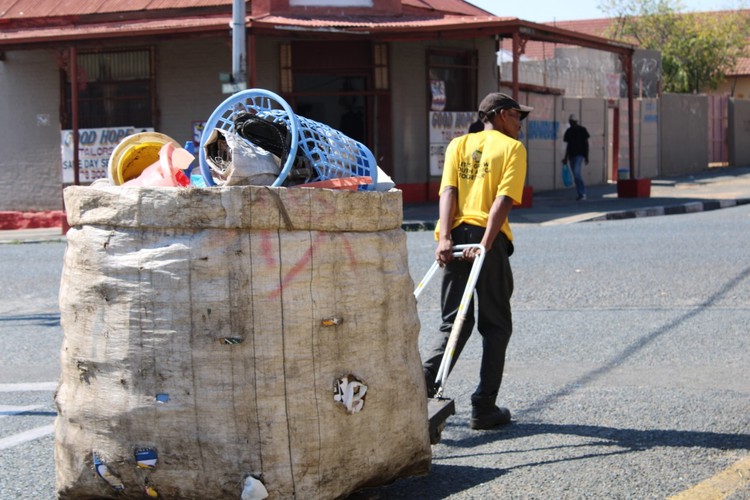Evicted waste pickers must be allowed to earn a living, court rules
Supreme Court of Appeal dismisses appeal by City of Johannesburg
A waste picker in Johannesburg. Archive photo: Masego Mafata.
- The Supreme Court of Appeal has ruled in favour of 71 waste pickers evicted from a property in Midrand.
- The City of Johannesburg wanted to move them to a place where they are unable to continue picking waste, arguing that their activities were unlawful.
- The Court ruled that they have a right to earn a living and that they must be provided with suitable alternative accommodation within 60 days.
The Supreme Court of Appeal has ruled that waste pickers evicted from a property in Midrand have a right to earn a living and that the municipality must provide them with accommodation that allows them to continue working.
In 2019, property company Rycloff, which owns the Midrand property, applied to evict 71 people who earn a living from waste picking. They had built shacks on the property to live there with their families.
Waste pickers sort rubbish at industrial sites and streets to find materials which can be sold to recyclers.
In 2022, the City of Johannesburg identified Kya Sands as alternative accommodation but said that the waste pickers would no longer be able to continue working once they were relocated. They objected to this.
The Gauteng High Court eventually granted the eviction order and ordered the municipality to provide suitable alternative accommodation by 4 March 2023, where the occupiers could continue their waste picking to earn a living.
The City appealed against the ruling in the Supreme Court of Appeal, making three main arguments:
- The City said the occupiers were conducting a “waste recycle business” which is a “commercial interest”, so, the “right to earn a living” was not applicable;
- The City said they did not have the right to choose where they would be moved; and
- The City said the collection, sorting and storing of material was unlawful because the area is a special zone in terms of municipal by-laws.
Rycloff argued that the court did not have the power to tell the City where it should move people, because this would undermine the separation of powers.
In response, the waste pickers, represented by the Socio-Economic Rights Institute (SERI), argued that the right to earn a living flows from the constitutional right to dignity. When a municipality provides alternative accommodation, it must act reasonably, considering all rights.
The International Commission of Jurists, acting as amicus curiae (friend of the court), argued that in terms of international human rights law, it is important for people to be relocated to places where they can earn a living or have access to work opportunities.
On 23 April 2025, Supreme Court of Appeal Judges Selewe Mothle, Tati Makgoka, Ashton Schippers, and Acting Judges Ronald Hendricks and Somaganthie Naidoo ruled in favour of the waste pickers, dismissing the appeal with costs and ordering the City to provide suitable alternative accommodation within 60 days.
The judges found that the waste pickers were not engaged in recycling as a commercial activity, but rather in the collection, sorting and storing of recyclable materials. There was thus no “commercial interest”, they said.
All spheres of government are meant to take measures to reduce the amount of waste, the judges said.
The judges disagreed that waste picking was unlawful and said it was, in fact, encouraged by the Waste Act. When pressed, the City had been unable to point to any law that supported this allegation. The bylaws do not prohibit the sorting and storing of waste material. Although Kya Sands was zoned as “special use”, the City had conceded that it was designated as a residential area.
The court conducted a site inspection and found that the material transported to the waste pickers’ shacks was not waste but materials extracted from the waste.
The judges found that the right to earn a living flows from the right to dignity because socio-economic rights should enable people to lead a dignified life. They pointed out that other courts had ruled that housing policies must consider the needs of the most vulnerable. For waste reclaimers, this meant their relocation should take into account their sole source of income.
Support independent journalism
Donate using Payfast

© 2025 GroundUp. This article is licensed under a Creative Commons Attribution-NoDerivatives 4.0 International License.
You may republish this article, so long as you credit the authors and GroundUp, and do not change the text. Please include a link back to the original article.
We put an invisible pixel in the article so that we can count traffic to republishers. All analytics tools are solely on our servers. We do not give our logs to any third party. Logs are deleted after two weeks. We do not use any IP address identifying information except to count regional traffic. We are solely interested in counting hits, not tracking users. If you republish, please do not delete the invisible pixel.

